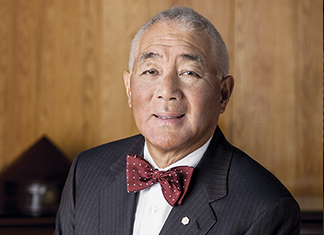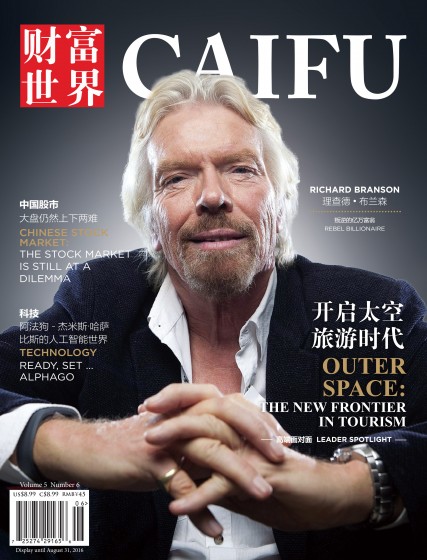Will Google’s Restructuring Be as Easy as ABC?
- Caifu Magazine | by Caifu Global
- EN
Now, Google is in the midst of a corporate restructuring by forming Alphabet, Inc., an umbrella company that will include Google Inc., Google Ventures, Google Capital and Google X research lab. Google will officially become Alphabet later in 2015, but at press time, the company has not disclosed specifically when this transition will happen.
By: Catherine Skrzypinski
| The world’s Internet search engine giant prides itself in taking risks with 21st century innovations like Android, Chrome, Search, self-driving cars and YouTube. |
Now, Google is in the midst of a corporate restructuring by forming Alphabet, Inc., an umbrella company that will include Google Inc., Google Ventures, Google Capital and Google X research lab. Google will officially become Alphabet later in 2015, but at press time, the company has not disclosed specifically when this transition will happen.
Google co-founder and current CEO Larry Page will become Alphabet’s CEO, while co-founder Sergey Brin will be Alphabet’s president. They will select and oversee CEOs to run each business, appointing Sundar Pichai as Google’s CEO in August 2015.
“In the technology industry, where revolutionary ideas drive the next big growth areas, you need to be a bit uncomfortable to stay relevant,” Page wrote on Google’s blog on Monday, Aug. 10.
“This is a very exciting new chapter in the life of Google – the birth of Alphabet,” Page continued. “We like the name Alphabet because it means a collection of letters that represent language, one of humanity's most important innovations, and is the core of how we index with Google Search. We also like that it means alpha-bet (Alpha is investment return above benchmark), which we strive for.”
Tech watchers like Nick Espinosa, chief information officer of BSSi2, a computer security company based in the greater Chicagoland area, told Caifu magazine on Monday, Sept. 14 that Google’s diversification will align with their vision in becoming the world’s primary data aggregator and supplier, as well as continuing to create products with universal applications.
For years, Google has been purchasing companies that have been outside of their search and advertising business, Espinosa explained. “They have been attempting to expand, and have been doing so aggressively – into biotech, automotive, mobile device, advanced artificial intelligence, robotics and other fields.”
“Like Microsoft controlling virtually the entire desktop market, Google wants to do the same for Big Data and future device platform development,” he added.
Espinosa pointed out how Google is radically restructuring its business now by freeing up Brin and Page to pursue this expansion further. “By removing them from the day-to-day operations of Google itself, they can now focus on directing upper management for all of their holdings more effectively,” he maintained. “It was an incredibly smart move for them.”
Taking Stock in Alphabet
It is business as usual for Google shareholders, as they now own Alphabet stock. Alphabet Inc. will replace Google Inc. as the publicly traded entity, Page explained.
Google shares will be converted into Alphabet shares having the same designations, rights, powers and preferences, and the qualifications, limitations and restrictions as the corresponding share of Google stock, according to Google Inc.’s Securities and Exchange Commission filing on Aug. 10.
Mountain View, California-based Google will become a wholly-owned subsidiary of Alphabet, Page continued. The company’s two classes of shares will continue to trade on the Nasdaq Composite Index as GOOGL and GOOG.
Google’s stock reached an all-time high right before the Alphabet announcement in July 2015, trading at nearly $700 a share after strong second-quarter earnings and the promise to investors that Google’s ad search will make money with smartphones, according to the July 17 issue of the Wall Street Journal.
The sky’s the limit for Google shareholders. Ronald Josey, Wall Street analyst at JMP Securities in New York, said Monday, Sept. 21 that Google stock would be worth around $847 a share after the Alphabet restructuring, according to MarketWatch.
“As a long-term investment, Alphabet appears to be very sound because it has proven leadership known for generating new ideas and avenues for wealth,” Espinosa said.
C Stands For … Conglomerate?
Balaji Srinivasan, a partner at venture capital firm Andreessen Horowitz in Silicon Valley, compared the formation of Alphabet to Warren Buffett’s holding company Berkshire Hathaway on Twitter the day of Google’s restructuring announcement. Berkshire Hathaway’s diversified portfolio includes auto insurance company Geico, undergarment brand Fruit of the Loom, railroad network BNSF Railway and fast food restaurant Dairy Queen.
However, Google founder Page wrote on Google’s company blog Monday, Aug. 10 that the move will ensure greater transparency and clearer oversight of its projects. “Sergey and I are seriously in the business of starting new things,” he wrote. “Alphabet will also include our X lab, which incubates new efforts like Wing, our drone delivery effort. We are also stoked about growing our investment arms, Ventures and Capital, as part of this new structure.”
“Google is definitely doing meaningful work,” Espinosa stated. “Their advancements in many different areas are helping to build a platform that can potentially enable millions to achieve success within multiple fields, especially in medical research.”
Espinosa said he disagrees with Alphabet/Google’s decision to retain patents and technologies. “While there is nothing wrong with that, it does lack certain nobility on their part. If they were smart, they would develop advancements in medicine and freely share the technology and patents with the world.”
Google’s Logo Makeover
The first step Google took after announcing the corporate reshuffle is giving its iconic logo a facelift with a new typeface Product Sans, designed to mimic writing from a grade-school book. It is Google’s most noticeable redesign since it dropped an exclamation point that appeared after its name until May 1999, reported Michael Liedtke of the Associated Press.
“So why are we doing this now? Once upon a time, Google was one destination that you reached from one device: a desktop PC,” Google's Tamar Yehoshua, vice president of product management, and Bobby Nath, director of user experience, wrote on Google’s blog on Tuesday, Sept 1. “These days, people interact with Google products across many different platforms, apps and devices – sometimes all in a single day.”
“It doesn’t simply tell you that you’re using Google, but also shows you how Google is working for you,” Yehoshua and Nath wrote.
The new version of the logo uses a custom sans-serif typeface that “maintains the multi-colored playfulness and rotated 'e' of our previous mark – a reminder that we’ll always be unconventional,” explained Alex Cook, Jonathan Jarvis and Jonathan Lee of Google’s material design team on the Google Design blog.
They added that the font combines the “mathematical purity of geometric forms with the childlike simplicity of schoolbook letter printing.”
“It’s cleaner and shows a more modern look,” Espinosa commented on the logo redesign. “Plus the multicolor 'G’ logo incorporates the multiple colors of Google in an attempt to show greater diversification of the Google brand.”
In the Fast Lane with the Self-Driving Car
Perhaps the most anticipated innovation in Google’s arsenal is the self-driving car, tech experts say. Google started designing the world’s first fully self-driving vehicle to transform mobility, and to make it safer and more enjoyable for people to get around.
“Google is not the first to pioneer this technology, but they're definitely at the cutting edge of it,” Espinosa noted. “The technology they're incorporating into their car is going to be one of the standards going forward in terms of connectivity of the vehicle to the road and other similarly equipped cars.”
Google's self-driving prototype cars have been built by Roush, an engineering and specialty manufacturer located in Detroit, Chris Urmson, director of Google's self-driving car project, told Reuters in an interview in January 2015.
To make driverless cars a reality, a universal standard for interoperability and safety communication – such as cars “talking” to other cars on a network to determine relative distance, or detect future speed hazards up the road – must be established, Espinosa explained. The National Transportation Safety Board (NTSB) will enforce this, so all automakers must adhere to its standards.
“If Google can set that standard, then they can own the technology in the industry and license it out to all automakers,” Espinosa said. “They recognize that other car companies have years on them in terms of producing an actual automobile. This is why they are pushing the Android Auto feature so much. It’s the stepping stone to acceptance of Google’s platform in all vehicles, regardless of make.”
Google executives have said they have not decided whether it will manufacture the self-driving car itself or sell software and systems to traditional manufacturers like Ford Motor Co., General Motors Co., Toyota Motor Corp., Daimler AG and Volkswagen AG.
“Ultimately [Google] wants to own the global network that all cars connect to for communication,” Espinosa clarified. “For a company that excels at revenue generation through advertising, imagine the kind of metrics they could create by tracking all vehicles en route to their destination, and also sending relevant advertising to the customer through its network.”
[Google’s] next tech hurdle in getting self-driving cars on the road is the human factor, Espinosa noted. “Their recognition system is currently having issues identifying pedestrians, but I'm sure that's a matter of 'when’ and not 'if’ that will be fixed.”
Espinosa forecasted the NTSB would adopt self-driving car standards by 2020 as long as research and development continues at its current pace.
“I have so much hope for the future,” added Mattan Griffel, cofounder and CEO at One Month, an online-accelerated learning platform with technology-based courses in New York. “We’ll all be in self-driving, electric cars within a matter of years.”
Spelling Out Success in the Future
“The future of Alphabet is expansion and consolidation,” Espinoza concluded. “I fully expect Alphabet to fill every single letter of the alphabet with a large company name and then continue to expand. I am optimistic that their shares will continue to rise in price as the portfolio expands. Google has never had a major blunder in its life, and I don’t expect Alphabet to either.”
“Google is not a conventional company,” Page and Brin wrote in their initial public offering letter to shareholders back in 2004. “We do not intend to become one… Our goal is to develop services that significantly improve the lives of as many people as possible.”















